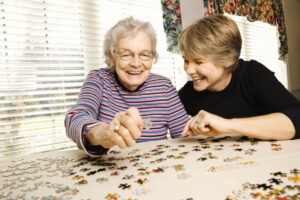In 2021, 6.2 million people age 65 and older are living with Alzheimer’s dementia, according to the Alzheimer’s Association. That means one in nine people age 65 and older has Alzheimer’s dementia, and seventy-two percent are age 75 and older. By 2050, the number of older adults who have Alzheimer’s and other forms of dementia is projected to rise to 12.7 million people.
According to the National Institute on Aging, “Alzheimer’s disease is an irreversible, progressive brain disorder that slowly destroys memory and thinking skills, and, eventually, the ability to carry out the simplest tasks.”
Alzheimer’s Disease
Alzheimer’s deeply impacts the quality of life of those that suffer from it. Some of the symptoms of Alzheimer’s include:
- Getting lost or wandering
- Repeating questions
- Inability to learn new things
- Misplacing items
- Taking longer to complete daily tasks
- Difficulty finding names for familiar objects
- Increased memory loss and confusion
- Shortened attention span
- Trouble handling money or paying bills
- Personality and behavior changes
- Struggles to cope with new situations
- Difficulty with thinking logically and organizing thoughts
Because Alzheimer’s is a continual loss of cognitive function, primarily including memory problems, it begins to impact an older adult’s daily life and activities. Occupational therapy is a non-pharmacological dementia intervention that helps manage the symptoms of Alzheimer’s dementia.
Need assistance now? Click here to contact us for help or schedule a visit.
Occupational Therapy for Alzheimer’s Dementia Patients
Occupational therapists help people with Alzheimer’s disease create a high quality of life through specific intervention strategies. They focus on maximizing engagement in activities, creating safe environments, improving the adult’s competency and sense of emotional well-being, simplifying tasks, and maintaining existing abilities for as long as possible. Occupational therapists evaluate each patient individually, looking at their daily activities to develop a plan for the most supportive environment to reinforce an Alzheimer patient’s strengths and abilities.
Often, a patient can remain much more independent in their activities with the addition of occupational therapies. They will help a patient create manageable ways to function in different areas of life:
- Communication
- Eating
- Hygiene
- Putting on clothes
- Bathing
- Using the bathroom
- Sleeping
- Moving (prevent falls)
Alzheimer’s dementia worsens over time, but occupational therapy supports patients’ abilities to remain independent, even when they are farther down the progression of the disease. Overall, an Occupational Therapist is setting up a living environment where an older adult can function better.
Occupational Therapy Treatments
While each patient is different, according to the American Occupational Therapy Association, there are some general strategies Occupational Therapists use with Alzheimer’s dementia patients:
- Modification–This is the most frequent form of therapy for memory loss patients. Through adaptation, personal assistance, social support, and verbal cueing, therapists can create safe environments for patients to live as independently as possible.
- Maintenance–Therapists can creatively provide support systems (such as signs on doors or having only seasonally appropriate clothing in closets) for the routines and daily habits that are functioning well for the patient.
- Health Promotion–For an Alzheimer’s patient, it is important to maintain the patient’s strengths as long as possible–this could be physical strength, cognitive awareness, or emotional stability. Occupational therapists follow all areas of health for a patient and create individual strategies to keep as many parts functioning well as possible.
- Remediation–While Occupational Therapists will not be able to restore cognitive abilities, they can use physical and cognitive exercises to help improve the daily lives of their patients.
An Occupational Therapist helps an older adult with dementia to do as many activities as they can independently. They work to keep their patients safe, especially from falls or physical injuries; they create strategies to prevent patients from wandering, maintain strong emotional connections, identify patients’ non-verbal cues for caregivers, and create opportunities for patients to engage in occupational tasks to feel productive.
Elder Care Alliance
At Elder Care Alliance, we have an innovative and engagement-focused memory care program. Our approach is founded on the belief that every person in need of memory support, dementia care, or Alzheimer’s care is fully capable of experiencing a high quality of life, regardless of the severity of memory loss. Our team members are grounded in four fundamental principles, honoring each resident through dignity, respect, independence, and choice. They have robust training – based on the latest research – in all areas of memory care.
Our caring staff combines specialized training with programming techniques designed for cognitive impairment delivered in a comfortable, residential setting. We work to replace the four A’s of Alzheimer’s (anxiety, agitation, aggression, apathy) with:
- Engagement
- Focus of attention
- Language expression
- Positive mood
- Accessing memories
- Emotional connectedness
- Social participation
- Short-term event memory
- Future orientation
If you’d like to learn more about our memory care program, please contact us, and we would be happy to answer any questions you might have.




















